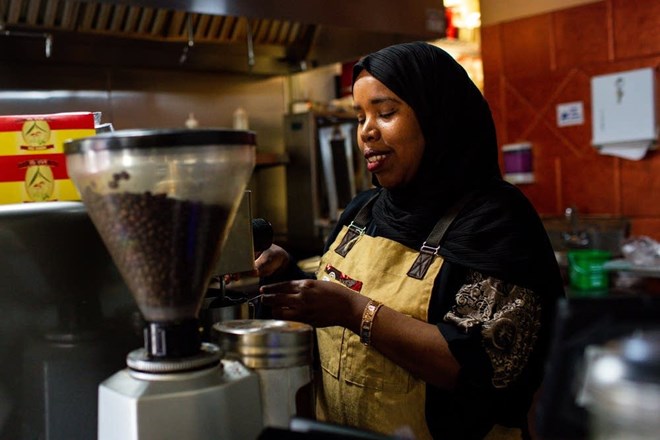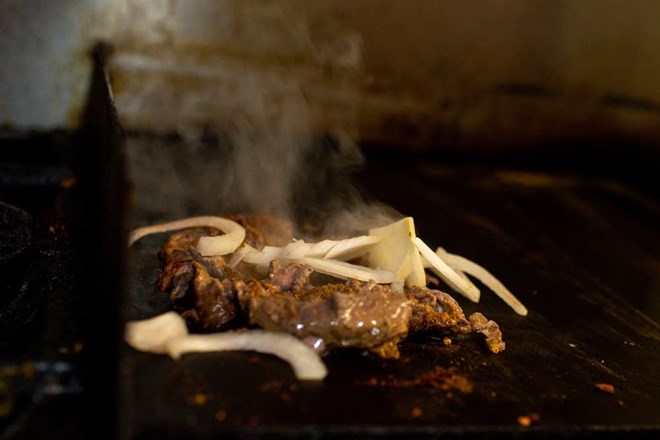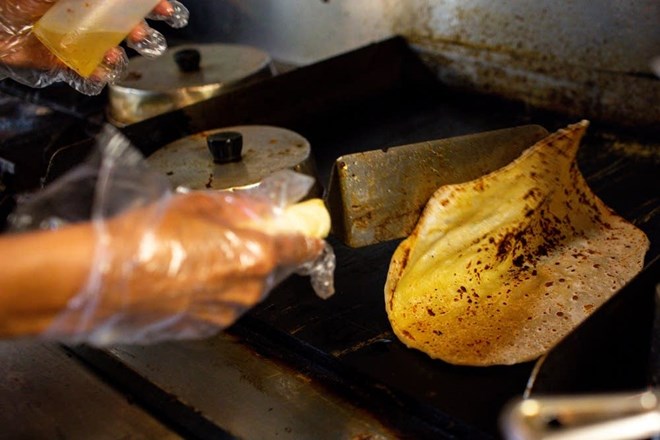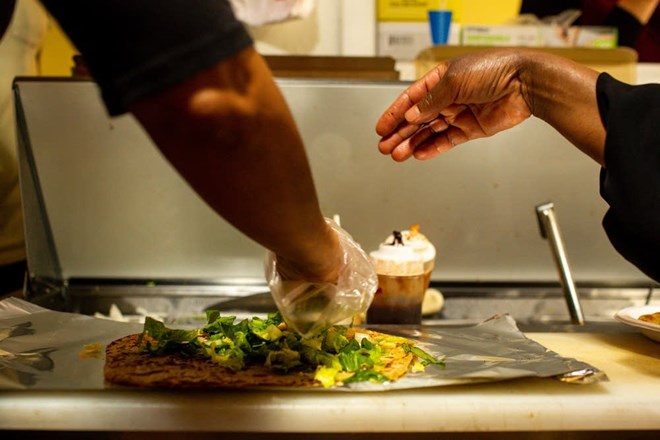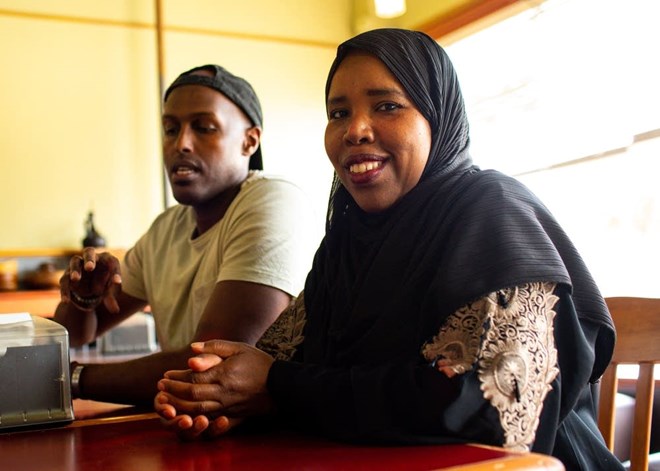
Thursday May 26, 2022
By Mecca Bos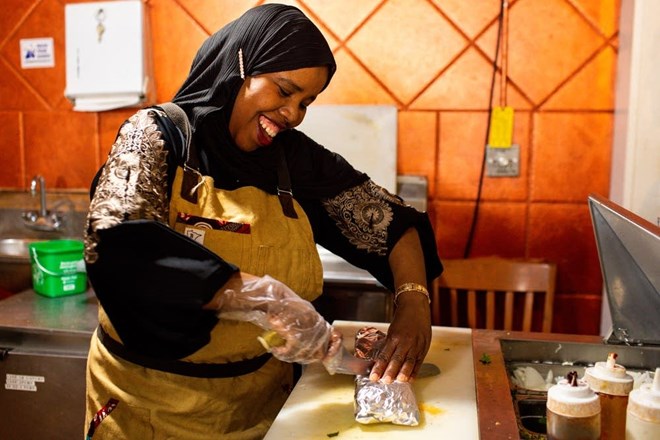
Karima Omer, owner of Sabrina's Cafe & Deli in St. Paul, slices a chapati and beef wrap.Nicole Neri for MPR News
Sabrina’s Cafe & Deli, in the East African enclave of St. Paul’s University and Snelling neighborhood is the kind of place where someone is always coming and going. A trio of radio producers with recorders rolling interview does not stop the real business at hand, serving customers who come and go at brisk intervals mostly in search of something fast -- and delicious.
And Karima Omer, who named the restaurant’s for her daughter Sabrina, has the goods.
The tiny storefront is modest and unassuming. A few sweets are on display in the bakery case, and the sound of the espresso machine fills the air. But more importantly the sizzle of Karima’s flat top grill is almost constant.
Like a good pie or slice of pizza, Omer’s creation is all about the foundation. The warm chapati bread has a pleasant, dense chew, with a freshly baked fragrance. This is no ordinary bread, and no ordinary sandwich. It’s all in the details.
“Most restaurants don’t make it fresh,” said Omer. “If I tried to buy it from outside, people would know.”
Standing at the grill, dressed in an apron over a dark abaya, she watched a small mountain of steak and onions sizzle as it absorbed her own mix of East African spices. When it was just about done she laid an uncooked chapati, about the size and thickness of a piece of copy paper beside it on the grill. The dough quickly rose and browned.
Omar said she stumbled on her signature dish creation by accident one day as she made lunch for herself. Short on time, she wrapped her steak mixture in a chapati warm off the grill.
“A customer walked in and said to me, ‘What are you eating? What is that?’”
She told the guy it didn’t have a name. She laughed as she told the story, and about how she just came up with something.
“‘It’s a chapati wrap!’ And he said, ‘Can you do it for me?’ So now it's popular and everybody knows now” she said.
Karima arrived in Minnesota in the year 2000, escaping the border war fare between Ethiopia and Eritrea. She said there had been war that in her country there was always war for as long as she could remember. Her family was unable to safely stay in one place when she was a child.
“We were kids and the way I grew up we would go to Somalia, Djibouti, Kenya-- so I can now say that America is now my home, more than my country,” she said.
But there are some things about home that she misses, and that includes mealtime.
“All of the family eats together from one dish. It’s very good, our country has everything, except peace,” she said.
My friend Jamal Hashi, local Somali chef and culinary instructor, introduced me to Karima. He also told me about East Africa, and the chapati’s popularity in the region. He said it reflects East African history, going back before when European colonists created new borders.
“Chapati is a very popular bread option,” says Jamal. “You will find it in Kenya, Somalia, Ethiopia, but all those regions before colonialism were just one, right? So people just roamed freely and you know, influenced one another. So now you can find chapati bread in Zanzibar, in Yemen, you can find it all the way to India and Pakistan, right?” he said.
“What makes Sabrina's chapati special is she makes it the traditional way that her mom taught her,” he said. “And it's fresh to order. And I don't think there's other places that are doing it the same traditional way, because it's a lot harder. There’s about five or six different steps that go into it.”
And her bread is so good, Hashi continued, that customers from all over converge on Sabrina’s in St Paul to enjoy it.
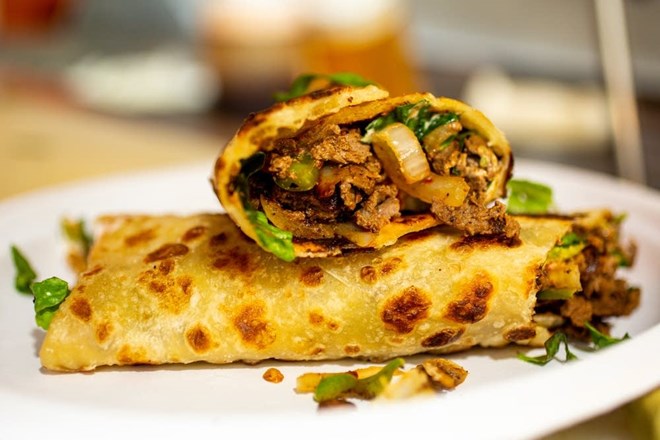
Chapati and beef wrap at Sabrina's Cafe & Deli in St. Paul.Nicole Neri for MPR News
“She gets Somali customers, she gets Ethiopians. She gets everybody. Because she gets Somali customers, she gets everybody. And I don't think there's other establishments that get that. Yeah I don't know any other restaurant that gets mixed crowds like this on a consistent basis" he said.
Karima Omer thinks the appeal is because she won’t serve anything to anyone that she wouldn’t herself love to eat.
“Back home we mostly get chapati like this on a special day like Eid [the end of the month-long dawn-to-sunset fasting of Ramadan]. You know why? Because it’s hard to make,” she said.
But Karima chose to make her famous chapati into a sandwich for a very American reason: being on the go during mealtime.
“I made a sandwich so you can go to work and you can drive in your car and eat,” she said.
It’s East African, it’s American. Karima’s cooking really belongs to everybody.
“There’s no borders at a restaurant,” said Hashi.
